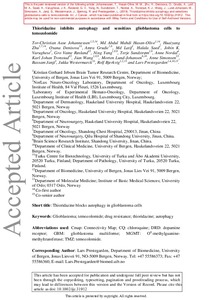Thioridazine inhibits autophagy and sensitizes glioblastoma cells to temozolomide
Tor‐Christian Johannessen; Md Mahdi Hasan‐Olive; Huaiyang Zhu; Oxana Denisova; Amra Grudic; Md Abdul Latif; Halala Saed; Jobin K. Varughese; Gro Vatne Røsland; Ning Yang; Terje Sundstrøm; Anne Nordal; Karl Johan Tronstad; Jian Wang; Morten Lund‐Johansen; Anne Simonsen; Bassam Janji; Jukka Westermarck; Rolf Bjerkvig; Lars Prestegarden
https://urn.fi/URN:NBN:fi-fe2021042827173
Tiivistelmä
Glioblastoma multiforme (GBM) has a poor prognosis with an overall survival of 14–15 months after surgery, radiation and chemotherapy using temozolomide (TMZ). A major problem is that the tumors acquire resistance to therapy. In an effort to improve the therapeutic efficacy of TMZ, we performed a genome‐wide RNA interference (RNAi) synthetic lethality screen to establish a functional gene signature for TMZ sensitivity in human GBM cells. We then queried the Connectivity Map database to search for drugs that would induce corresponding changes in gene expression. By this approach we identified several potential pharmacological sensitizers to TMZ, where the most potent drug was the established antipsychotic agent Thioridazine, which significantly improved TMZ sensitivity while not demonstrating any significant toxicity alone. Mechanistically, we show that the specific chemosensitizing effect of Thioridazine is mediated by impairing autophagy, thereby preventing adaptive metabolic alterations associated with TMZ resistance. Moreover, we demonstrate that Thioridazine inhibits late‐stage autophagy by impairing fusion between autophagosomes and lysosomes. Finally, Thioridazine in combination with TMZ significantly inhibits brain tumor growth in vivo, demonstrating the potential clinical benefits of compounds targeting the autophagy‐lysosome pathway. Our study emphasizes the feasibility of exploiting drug repurposing for the design of novel therapeutic strategies for GBM.
Kokoelmat
- Rinnakkaistallenteet [27094]
